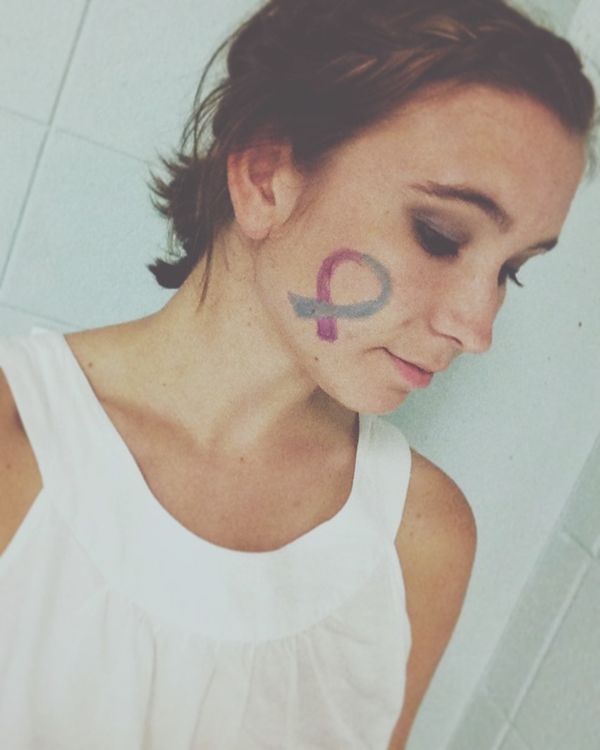Grace Loncar had a lot to say.
Her best friend, Will Shafer, described her as talkative, witty and sarcastic with a dark sense of humor.
But underneath the bluntness, a war was waging.
"She had been struggling with depression and anxiety and all of that since she was literally a toddler," said Shafer, a junior musical theater major at Coastal Carolina University.
Grace's struggle with mental illness may have been what made her so dry and witty, but that same mental illness led to a suicide attempt at only 9 years old and ultimately caused her death at 16.
On Nov. 26, 2016, she used her dad's hunting rifle to take her own life.
"Her family was very aware that she was at high risk of potentially attempting suicide or harming herself, so they never really kept guns around," Shafer said.
Despite that, Grace's father had gone on a hunting trip earlier that day. He assumed it would be OK to leave his gun at home for one day before returning it to the friend from which he had borrowed it.
"It just happened to be there at the right time, I guess," Shafer said.
Stories like Grace's are not uncommon. According to the Harvard School of Public Health, adolescents who die by suicide are more than twice as likely to have a firearm in their home than those who had attempted or never attempted suicide.
Shafer said stricter gun control laws may have stopped Grace from being able to take her own life.
"It had a lot to do with it being readily available," Shafer said. "I know people want to say, 'Gun control laws aren't going to stop people,' which I guess is partly true, but it would definitely make it less readily available for a lot of those people, which obviously couldn't hurt."
One set of laws proven to reduce suicide rates are "child access prevention" (CAP) laws. CAP laws impose criminal liability on people who negligently store firearms where minors can access them. In states that have passed CAP laws, suicide rates are lower by 8 percent, according to a study from the Johns Hopkins Bloomberg School of Public Health.
Another set of laws are "extreme risk protection orders" (ERPO), also known as red-flag laws. These laws allow family members or law enforcement to petition for temporary confiscation of firearms for someone they think may be at risk of harming themselves.
Allen, TX City Council member Lauren Doherty said she believes red-flag laws would be effective, but only if everyone takes it seriously.
"Other people in the household need to understand that person's safety is more important than them having their weapon," Doherty said.
"If there's four people in a household and one of them has a red flag on them, the other three need to understand that the weapons in the household need to be gone for some period of time until that person is safe."
One significant factor in the gun control debate as related to suicide is the fatality rate of firearms. Sarah Victor, an assistant professor of psychology at Texas Tech, said having access to lethal means leads to a dramatic increase in the risk of death by suicide.
"This is something that can be a little bit politically controversial, but the data are actually very clear," Victor said. "The last data I saw suggested that about 3 percent of suicide attempts use a firearm, but over half of people who die by suicide in the U.S. die using a firearm."
Firearms are by far the most lethal method of suicide attempts, according to the Harvard School of Public Health. Eighty-five percent of suicide attempts using a firearm are fatal, while other methods have an average fatality rate of less than 5 percent.
Victor said the disproportionate fatality rate also affects the rates of suicide between men and women. She said suicide attempts are more common in women, but suicide deaths are more common in men.
"Women are far less likely to use a firearm as a suicide attempt method," Victor said, "and as a result, they're much less likely to die on average from a suicide attempt."
Easy access to firearms significantly increases the risk of suicide. A study done by the Harvard School of Public Health compared suicide rates in the states with the highest and lowest rates of gun ownership. Each group had a comparable population size.
The Harvard study found non-firearm suicide rates were about the same across both groups, but firearm suicide rates were almost four times higher in high gun ownership states, and the overall suicide rate in high-gun states was almost double the rate in low-gun states.
City Council member Doherty said gun reform is a logical step in suicide prevention.
"We need to have these sensible gun laws," Doherty said. "The argument against them is, 'Well, it's not going to save every person.' You may not do 100 percent, but harm reduction is the goal."
The other topic widely discussed regarding both suicide prevention and gun control is mental health. Elena Sanchez-Freeman, the RISE Program Director for Health and Wellness, said mental health is the contributing factor to a person deciding to take his own life.
"It is the distress in their mental health," Sanchez-Freeman said. "Mental health is the factor in itself that contributes to those thoughts."
However, when it comes to receiving mental health care, cost is often a barrier. According to the Department of Health and Human Services, over half of adults with a mental illness did not seek treatment because of the cost.
One influential factor in the issue of unaffordable health care is insurance. The Bowman Family Foundation reported people sought out-of-network care much more frequently for mental health care than for medical or surgical care at rates four to six times higher.
The foundation also estimated insurance providers reimburse mental health care providers 20 percent less than medical or surgical providers. As a result of high rates of out-of-network care and lower insurance reimbursement rates, even insured patients are forced to cover costs largely out-of-pocket.
Psychology professor Victor said the current health care system is too focused on intervention once something has already occurred, and it should be concentrated on prevention. She said because of how the system is set up, people with mental health concerns often don't get care until it is too late.
"I think if there were a shift," Victor said, "in terms of what the government is willing to pay for or what insurance companies are willing to pay for, to actually get people help earlier when their issues are at a lower severity, you would see fewer people getting to this crisis point."
City council member Doherty said she believes the health care system needs to be fundamentally changed so it can address issues of prevention, rather than Band-Aid-type solutions to larger problems.
An example of these temporary solutions is prescription medication for mental illnesses. According to the Physicians for a National Health Program (PNHP), private insurance companies prefer to cover medication rather than therapy because it is more profitable, even if it is not effective for everyone.
PNHP also reported insurance coverage for therapy has decreased from 6 percent to 2 percent of all insurance payments since the mid-1980s.
Public insurance, such as Medicaid, significantly reduces costs for people seeking mental health care. Deductibles and co-pays are limited to small amounts, typically between $4-$8, according to the Medicaid website.
Another benefit of a public system is increased efficiency. The Center for Economic Policy and Research (CEPR) reported that private insurance could carry between 12.3 percent to 18.8 percent of their total health expenditures on overhead costs, compared to less than 2 percent in overhead spent by public options such as Medicare.
The CEPR report indicates under a public system, people would incur less out-of-pocket costs for mental health care, while also spending that money more efficiently.
City council member Doherty said a universal health care system is important to suicide prevention because it would make mental health care a right, rather than a privilege for those who can afford it.
"A lot of therapists don't even take insurance," Doherty said. "If you're poor, you can't afford that at all, so you're just going to forego it, because it's going to be $250 for a 45-minute session or pay your car payment."
Psychology professor Victor said another issue that prevents people from getting mental health care is the stigma that surrounds it.
"Depending on the person, there can be this kind of stigma or bias around getting mental health care in general," Victor said, "like, 'I'm not the kind of person that needs that help. I'm just going to figure it out on my own. I'm going to tough it out. I don't need someone to tell me how to feel differently.'"
Nick Watts, pastor of Bacon Heights Baptist Church, lost his 19-year-old son to suicide. He said mental health care is crucial to preventing suicide, despite the stigma around it.
"When you consider mental illness," Watts said, "it's no different from dying from cancer, diabetic coma, or any other disease. We tell people our son died from a disease."
Pastor Watts began to get emotional as he told the story behind the tattoo he got as a tribute to his son, a Bible verse from Psalm 23 written in Hebrew — the same tattoo his son used to share his faith.
"We're all the same when it comes down to it," Watts said. "We need to be loved, we need to have value, we need to have a purpose, we need to feel cherished."





















